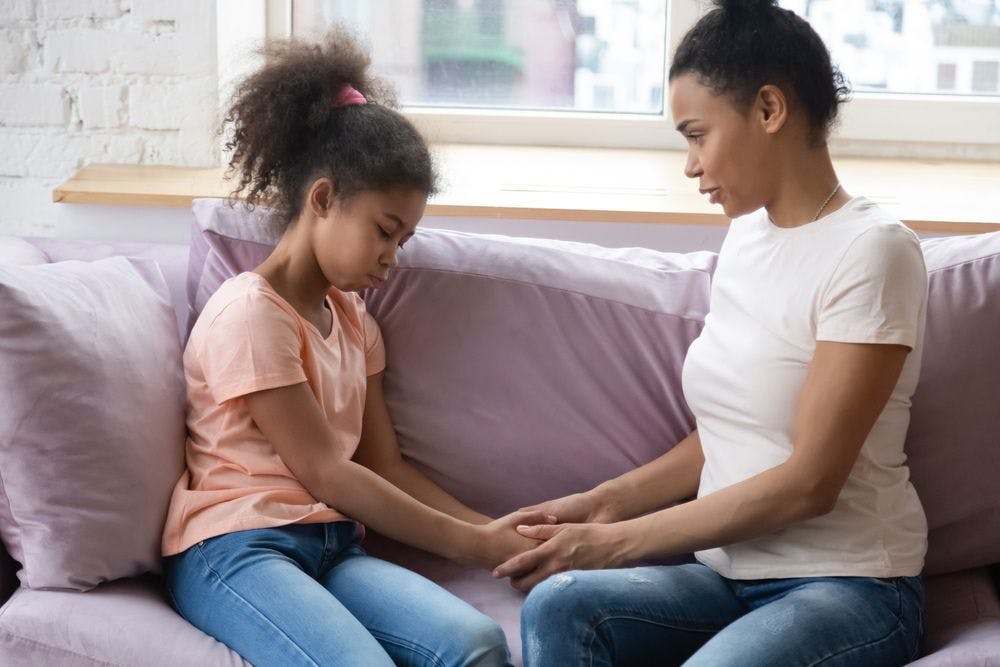
We get tips from a grief and trauma counsellor on supporting a child with a fear of death
Death anxiety is the fear someone feels when they become acutely aware of, and apprehensive about, dying and death. In this time of Covid-19, there is so much reporting of death across the media, it can become overwhelming – particularly for children.
Here, grief and trauma counsellor Lianna Champ shares her tips for supporting children and young people with a fear of death.
Have a chat
Find out what your child already knows about Covid-19. Ask them what they have learned and if they have any questions. When they talk, listen. Don’t try to distract them in an attempt to try and make them ‘forget’. They won’t and this gives you an opportunity to give them the correct information. It is important to create a sense of security and to keep the scale of reality.
To help reduce their anxiety about the pandemic, explain how the NHS, doctors and all key workers are still working and doing everything they can to keep people safe and that the scientists are working hard with the vaccine. Explain to them that death from the virus is still rare, despite what they might hear, and let them know how so many more people survive than die. The main thing is to create a sense of security and explain that most people who get the virus feel like they have flu and do recover.
Technology – our life saver
Now more than ever technology is our life saver. Encourage children to build into their daily routine video calls with grandparents and other relatives to help reduce feelings of isolation.
They will usually be in touch with their friends. Get involved too so you can monitor what they are up to.
The importance of family time
Repeated reporting of the pandemic can make it feel as if it’s going to swallow us all, therefore have discussions about other things that are happening too, so Covid-19 doesn’t overshadow everything.
Don’t let children spend hours on their phones, laptops, etc. Human interaction, conversation and closeness are more important now than ever, so structure inclusive activities like board games, quizzes, and music to prevent children withdrawing and becoming introverted during this time of social distancing.
Be open and approachable. Let them know that they can come to you with any questions or fears they may have.

Hygiene
Let them know that by being clean and washing their hands regularly can help stop viruses spreading to other people. Also having lots of sleep, eating wel,l and exercising can help to keep them strong and healthy. This is a great time to educate your child about self-care.
Teach them how to thoroughly wash their hands, and to really think about the foods they are eating - are there enough vitamins, proteins, healthy fats, etc? This will give them some semblance of control and give them a project!
Honesty is always best
... And knowledge is power. They may have been told something or heard adults in conversation and may be worrying unnecessarily. Always answer any questions with total honesty. Let them know that it is ok if they are scared or feel sad about what is happening. Don’t try and change how they feel. All children, whatever their age need to be able to have their own reactions without being made to feel that there is something wrong with them. Be calm and reassuring, this is a new experience for us all and it’s OK to have a wobble now and then.
The way we teach children how to cope with a major change in childhood sets a pattern for the rest of their lives. We can teach them to embrace all life experiences and to process their emotional responses – good, bad, happy or sad – as they arise. Life is not an endless series of happy moments and is always interspersed with traumas. By accepting and experiencing all life events as they occur we can live fully and meaningfully as long as we can process emotional events practically as they arise, deal with them and move on.
If someone does contract the virus, you shouldn’t hide the fact from children that they may not recover. We cannot control how or when we die but we can control how we live. Introduce the idea of saying all the important things to each other and explain that we can’t always choose how or when we die, we can only make sure that we all know how important we are to each other and that we have to put our love into words. Now more than ever this is important as we cannot reach out and hug those we are isolated from.
Need support? Connect with a counsellor by heading to counselling-directory.org.uk

